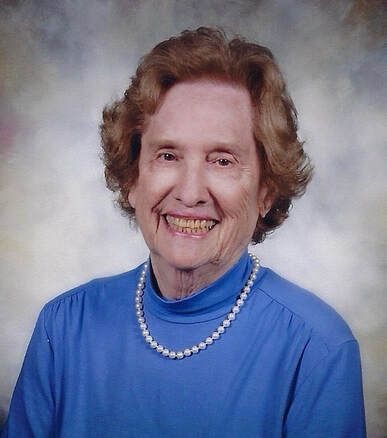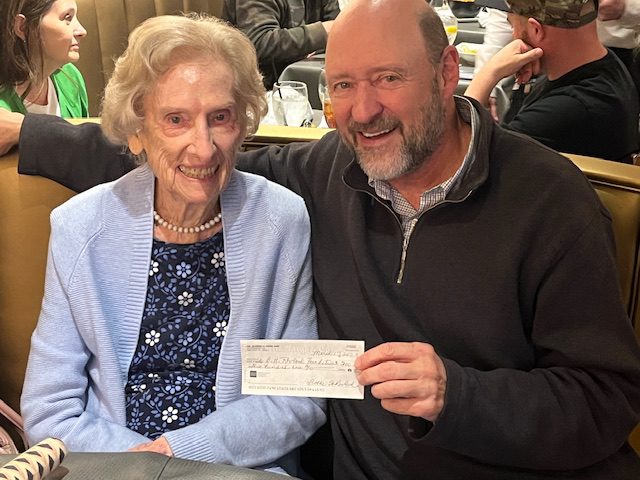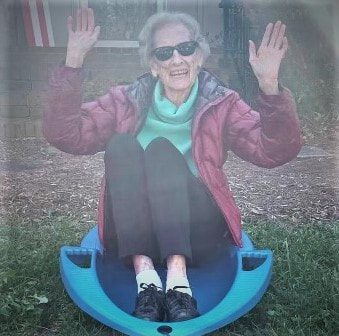In Memoriam: Trailblazer B.H. Rowland leaves legacy in early childhood education in Charlotte, state policy and beyond
To say Bobbie Rowland was one of a kind would be an understatement.

In a time where women educators stayed in the classroom and men made the policy decisions, she took up the cause of early childhood education in North Carolina and wouldn’t hear “no” from anyone. She became the first woman elected to any school board in North Carolina and the first female trustee of Gaston College.
Rich Lambert, the director of the Center for Educational Measurement and Evaluation, started as a young faculty member that Rowland took under her wing in 1996 and soon grew into a close personal friend. The way he tells it, “We all marveled at the way Bobbie was never intimidated by anyone or any obstacle placed in her path. She knew what was right, knew what she believed, but many people could say that. She was one of few who put her beliefs into action.”
“I can just hear her saying, ‘What do you mean, I can’t go talk to that teacher? What do you mean, I can’t go talk to the dean, or the president of the university or the governor?’ She had a streak from the late 1950s through the mid-2000s where she had personally met and advocated with every governor of North Carolina. And then, of course, ‘what do you mean, I can’t talk to the Secretary of the U.S. Department of Education?’ One time, she called the Department of Education and said, ‘I’m going to invite you to come to Gastonia, because I’ve got this great classroom you’ve got to come see.’ And he came!”
Rowland was a fierce advocate at all levels for early childhood education and developed the curriculum at UNC Charlotte that would become both the B.A. in Child and Family Development as well as the M.Ed. in Special Education’s concentration in child and family studies. Among her many accomplishments, perhaps the strongest standout is that she played an integral role, along with state senator Helen Rhyne Marvin and other influential political leaders, in securing approval and funding for public kindergarten across North Carolina.
Then, never one to settle, she set new sights on universal pre-kindergarten. Lambert recounted, “She was there at the beginning of Bright Beginnings, which is our locally funded pre-kindergarten program in Charlotte-Mecklenburg Schools, and then she was also instrumental in designing More at Four. It was our first publicly funded pre-kindergarten program in North Carolina, which has now become the NC Pre-K Program.”
Lambert and Rowland together founded what has grown into the Early Educator Support Program (EES), which originally began as a program within the N.C. Department of Public Instruction (NCDPI) to provide mentoring, performance evaluation and professional development to educators teaching pre-K in North Carolina. Eventually, it grew so large that NCDPI instead contracted it out to two UNC System schools funded by grants, UNC Charlotte for the western half of the state and East Carolina University for the eastern half. Rowland brought her early childhood expertise, and Lambert brought his background in statistics and evaluation — they made a great team. Initially, they were both consultants, working their own caseloads, but as the program grew, they moved into leadership and mentor roles.

Lambert long considered Rowland his mentor, even as she moved into semi-retirement and returned to case work under his leadership at EES. “I kind of became part of her family over the years. We spent so much time driving around North Carolina, going to meetings and observing teachers, doing professional development sessions. But we spent a lot of time together, and it was really, really special. And it was great to have such an effective mentor — mentoring often doesn’t work, but when it’s practical like that, it’s different.” She worked full-time both as faculty in the college as well as her EES involvement until age 73, but until age 86, Lambert estimated, she continued to work part-time with her own caseload of teachers to mentor.
Mentoring was part of the fabric of Rowland’s character. Current special education faculty Heather Taylor was Lambert’s graduate assistant when she first met Rowland doing advocacy work in Raleigh. “She was so sharp. She really assessed people. She did that with me, you know — who is this girl, what is her thing? Bobbie was very good at pointing out and discovering what people’s strengths were.”
Much like Lambert, Taylor grew from just a colleague into a trusted friend, working closely with Rowland and driving around the state with her. Taylor said of her mentor, “She had a way of of speaking that you just wanted to listen to her. Education has changed so much, we’re not teaching the same way we used to, and I think Bobbie was way ahead of her time because she was already making those connections in real time with people and made it seem effortless. You didn’t feel like you were in a classroom listening to a lecture; she found ways to engage you in that process in that learning process.”

Lambert recounted a particular classroom visit he and Rowland took on that exemplified her instructional style. “The students were playing in the dramatic play, and they were pretending like they were in a in a car, going somewhere. One kid was the driver, and there were these seats set up, and Bobbie somehow got herself invited into the car. She had this magical way of not disrupting what was going on and working her way into the children’s world. So the teacher comes over like she’s going to get involved, and she tries to get herself into the car. And the kid who’s playing the part of the driver looks and says, ‘Well, you’re not with us!’
Afterward, in the post-observation process, she said to the teacher, ‘I know the problem with your classroom problem with your classroom. It’s you!’ which was obviously hard to hear. But she was the quintessential steel magnolia, where she could deliver a hard message but still come away with it as your new best friend.”
Though she might come across as more of a spitfire, like any great trailblazer, Rowland could not be put in a box or a stereotype. Taylor described her as a grateful person, often taking time to reflect on the challenges she had faced and the hardships in her life, and instead of letting it make her sad, bitter or even proud, she would say how grateful she was for the full life she had lived and the opportunities she had had given to her and made the most of.
Taylor added, “She would say often how the difference between herself and maybe some other people was that she actually took chances, and she took the opportunities when they became available to her. But she said, ‘I don’t think a lot of people see sometimes that they have opportunity when, in fact, they do.’ I was keenly aware of when those opportunities were coming and I took them. I took a chance, like she said, and sometimes things didn’t work out exactly perfectly. But I learned from her in that way.”
One final memory from Taylor was maybe the most telling about how humbly Rowland moved through the world. “She said something to me once. ‘There’s a lot of things I was good at. A good mother, a good scholar… but I wasn’t a good friend.’ And I was surprised that she said that, so I asked her why, and she said, ‘I didn’t put time into it. I put time into my career, and being a mother and an educator and everything else.’ But I felt just the opposite. She was an amazing friend and probably didn’t even realize that what she was doing, how she was present for so many of us, how she was teaching as she was becoming your friend.”
And Taylor made it known that it wasn’t only her that felt that way. Rowland’s memorial service was full to the brim with family, friends, colleagues, and people she had impacted throughout her life.
“There were things that she said that we called Bobbie-isms, and my favorite one was: thinking about doing isn’t doing,” Taylor said. And while she did a lot of thinking, Rowland certainly also made good on the doing. Cato College is grateful for the enormous contributions of Bobbie H. Rowland throughout her storied career, and she will be dearly missed.
For more information on Rowland’s legacy and how her work is being carried on, visit the B.H. Rowland Foundation.